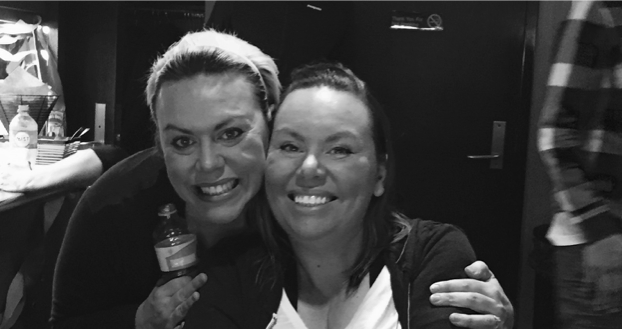ALS diagnosis brings new meaning to fundraiser
Molly Osborn (left), Orangetheory studio manager, with her late sister, Sara Hankins (right) in the beginning of her diagnosis with ALS.
June 2, 2019
As ALS Awareness Month ends, Molly Osborn, senior studio manager at Orangetheory Fitness, finds a new meaning in one fundraiser.
Osborn lost her older sister, Sara Hankins, to Lou Gehrig’s Disease or amyotrophic lateral sclerosis (ALS) in March 2017. ALS is a progressive disease which cause the neurons between the spinal cord and the brain to degenerate, according to the ALS Association.
Osborn said it was difficult to diagnose Hankins due to previous health problems. Osborn explained Hankins had a brain tumor and seizures which caused them to think the weakness were side effects of her medications.
The diagnosis process was prolonged due to multiple consultations with doctors to see if there were any other explanations, ultimately resulting in Hankins being diagnosed with ALS in 2014.
Since there is a progressive degeneration of motor neurons, which allows the brain to control the muscles, voluntary mobility, such as communication, becomes difficult. The common cause of death for those with ALS is when the diaphragm collapses.
Osborn said Hankins tried to keep a positive attitude despite the situation and maintained her dignity throughout her time. Osborn described her sister as supportive and humorous with a “beautiful smile.”
“She [Hankins] was one of those people who just always found a way to make a connection and make someone feel comfortable,” Osborn said. “She could have a conversation with anyone, which is something that not everyone can do and be genuine about.”
Osborn said her whole family moved into their mother’s home in order to take care of Hankins, resulting in Osborn quitting her job and becoming her full-time caregiver. She said she tried to maintain a positive outlook with the situation and ensure that Hankins remained comfortable through different activities.
Osborn said she often had to help Hankins with daily activity such as eating, as well as making sure she is comfortable. She said she tried to fill Hankins’ life with “love.”
When Hankins died, Osborn said she felt a combination of sadness, grief and relief.
“Especially towards the end of her care, I didn’t really get to think of her as my sister; I was like full on caregiver mode … that all kinda hit me at once after she passed and obviously that still something that hit me now,” Osborn said.
Osborn explained she did not know what to do after her sister’s death, since she no longer had a full-time job.
“She was my full-time gig,” Osborn said.
She said she found herself at Orangetheory through her brother who was going to be a studio manager, and fell in love. Osborn said she liked how Orangetheory got involved with the local community, supporting various fundraisers. This eventually led her to supporting “Augie’s Quest,” a fundraiser to research cures and medications for ALS.
Osborn said she felt security by being part of Orangetheory and its fundraiser, knowing she is representing her sister.
“One of those ‘ah ha’ moments that I’m doing exactly what I should be doing,” Osborn said.
In 2018, Augie’s Quest had raised more than $4 million while in 2019 Orangetheory exceeded their goal of $100 thousand.
Although the fundraising for Augie’s Quest has ended, Osborn said there are ways to locally get involved with organizations that support those with ALS. A local ALS chapter, which is a hyper-local organization, is one way to get involved while another is by helping families with everyday tasks.
To support or learn more about Augie’s Quest, visit www.augiesquest.org. .

















